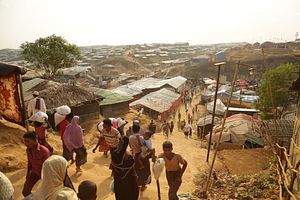More than a million Rohingya live cheek to jowl in the world’s largest refugee camp. If the Bangladeshi authorities don’t move expeditiously to prepare for the arrival of COVID-19, it is all but certain to be catastrophic, not only for the Rohingya but Bangladesh and the rest of the world.
I was born and raised in a Rohingya refugee camp in Bangladesh but was fortunate to be resettled 11 years ago in the United Kingdom through a United Nations program. I visited my birthplace last December and saw the harrowing conditions of the camp – open sewers, malnutrition, virtually no social services or educational opportunities. I spent two months in the camps living with my grandparents and extended family, where I shared the small bedroom in which I had been born with eight others. I was horrified that the situation for the million refugees was no better than when I left.
Even under the best of circumstances, it is beyond the means of Bangladesh, a poor and densely populated country to provide substantially better conditions. But it is within the power of the government of Bangladesh to lift the internet blackout that has kept the Rohingya largely cut off from the outside world and which leaves them especially vulnerable to COVID-19.
For over six months, Rohingyas have not had access to the internet or cell phone data. They have been cut off from news about their relatives still in Myanmar, international developments concerning their future, and most recently, accurate and reliable information about COVID-19 and the steps countries are taking to address it. They would have no means of knowing, for example, who has tested positive for coronavirus in the camps or how to contact hotlines as opposed to showing up at hospitals which may be already at overcapacity.
There is also a personal cost. As Nazir Ahmed, a resident of Kutupalong camp said, “We are trapped in an open prison […] we have nothing to do. Not being able to communicate with our families makes us very sad.”
In the 21st century, access to the internet is a fundamental human right. Article 19 of the Universal Declaration of Human Rights after all says “everyone has the right to freedom of opinion and expression; this right includes freedom to… seek, receive and impart information and ideas through any media and regardless of frontiers.” Can you imagine being quarantined in the world’s largest refugee camp, cut off from the rest of the world?
Last December, the International Court of Justice, the world’s highest court, held a hearing as the government of Myanmar stood accused of crimes of genocide against the Rohingya people. At the time, I was in the camps with my family and due to the internet blackout, it was incredibly hard to get information about the proceedings.
Earlier this week, the Bangladeshi health authorities detected a case of COVID-19 in Cox’s Bazar, a bustling trading town less than an hour away from the camps. The Bangladeshi authorities ordered an immediate lockdown of the camps without any warning or information about how to maintain hygiene and protect oneself from the virus. The camps are so densely populated that any disease, especially an infectious one like COVID-19, could infect the vast majority in a relatively short period of time.
Giving the Rohingya people access to internet and cell phone data is the only means of providing enough information to allow residents a fighting chance in limiting the spread of the virus. The lack of awareness of the virus in the camps have led to various misunderstandings and rumours, which inevitably create panic and chaos. Information is not a luxury, but a basic right and essential to securing the wellbeing of the Rohingya people.
If the pandemic reaches the camp, an already grave situation will be immeasurably worse. To keep Rohingya in the dark about the looming threat and the ability to take steps to protect themselves will put millions at risk, inside and outside the camps. Given the high transmission rate – if you don’t tackle an outbreak in Cox’s Bazar it almost guarantees the rest of Bangladesh will get it. We are all in this together and we all need access to the information to fight this together.
I urge Prime Minister Sheik Hasina to immediately lift the ban on cell phone data in the refugee camps.
I spent valuable time with my family during my visit, but I have not been able to reach my grandparents since I left. We, Rohingyas, need access to information. It is essential to our survival.
Sirazul Islam is the Youth Advocate for the British Rohingya Community UK, a human rights group.
































